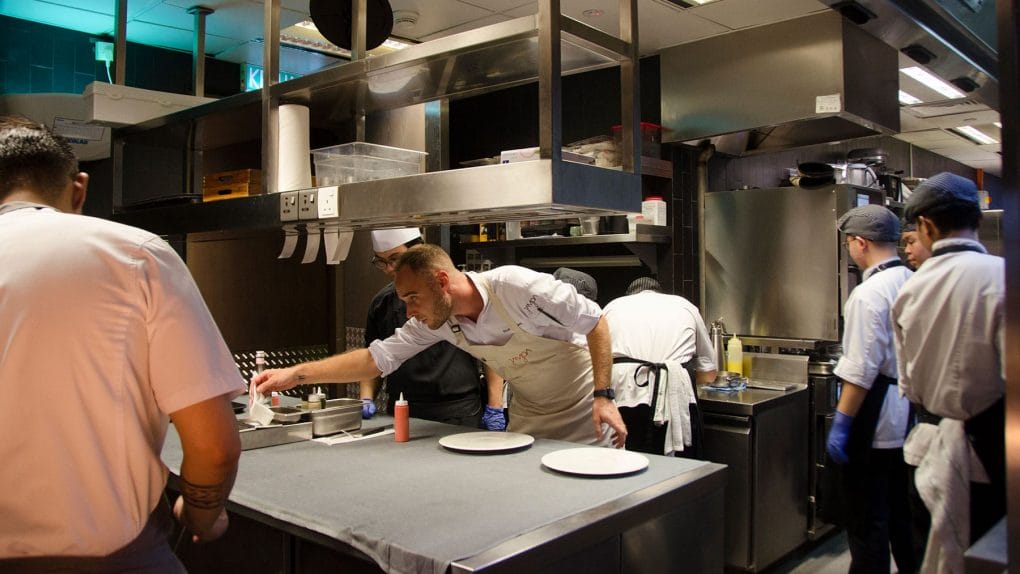In recent years, one-night-only events have carved a niche as a creative playground for chefs. Ephemeral dinners are becoming more common, with restaurants spotlighting collaborations between chefs from all culinary backgrounds. Their limited nature—a single night, a single menu—is curated to be savoured once, attracting discerning diners who value exclusivity and artistry in equal measure.
This particular night belonged to EQ Kuala Lumpur’s Sabayon chef Steve Ariffin and Jampa Phuket’s chef Rick Dingen. Brought together by Kita Food Festival, the two chefs served up a flavour-dense seven-course menu that put sustainable fine dining front and centre. An integral practice to modern gastronomy, sustainability is now redefining the philosophy behind each plate, from farm to finish. However, keeping it eco without losing substance is a subtle art, one that requires mindful compromise. For Ariffin, it’s about finding that sweet spot. “It’s all about the balance,” he said. “We embrace creativity and indulgence, but we also remain conscious of our responsibility to reduce our culinary carbon footprint.” One of the key ways he puts this into practice is by reintroducing homegrown ingredients at Sabayon, to demonstrate that fine dining can be rooted in local soil. “This is why we spend a fair amount of time looking for exceptional local producers and crop growers of premium produce,” Ariffin added.
Over at Jampa’s kitchen—where Dingen champions zero-waste cuisine over open flames—the creative process unfolds through exploration and intuition. “We experiment in different ways, whether they’re raw, cooked, or seasoned. We then play around with flavours and techniques to see what shines,” the Dutch chef explained. The goal, ultimately, is to let each ingredient guide the dish.

The barbecued carrot dish was a prime example, which Ariffin described as “chef Rick’s masterclass in restraint—a humble carrot, transformed.” Sourced from the local farm collective Weeds & More, the carrots were barbecued to a gentle char, lending a mild smokiness while keeping the inside tender. The carrot tops were fermented into a pesto, paired with a sauce made from macadamia nuts and fermented soybeans, and finished with a sharp gooseberry vinaigrette. Everyone at the table seemed to agree that this dish spoke the loudest.
Delicately layered, the heirloom tomatoes offered an unexpected composition. From the first bite, it was clear why the dish left a lasting impression. Prized for their robust depth, the tomatoes were bathed in a light, aromatic broth and paired with strawberry and bael fruit (also known as Bengal quince or wood apple). It was an inventive interplay of sweet, sour, and savoury, captured in a single plate.

Synergy matters, but so does distinction. Dingen led the way with plant-led creations, while Ariffin took charge of the protein-centric dishes. “We built a collaborative foundation—jointly selecting the core ingredients, then structuring the menu to reflect each outlet’s identity,” Ariffin said. The sea bream shone with a deliberate approach, lifted by the salinity of clams, fennel, and fresh English parsley. The corn-fed chicken was an interesting one, as the meat was finely restructured and reassembled before being baked into a unified form. A glossy chicken jus tied it all together, made richer with glazed mushrooms and the warmth of nutmeg emulsion.
From activism to preservation, being a chef today means stepping into roles that go well beyond the stove. “Chefs are the frontliners of the culinary world,” Ariffin said. “The sooner we embrace this shift, the quicker our guests will catch on and grow into more responsible diners. Social media can help spread the message, but nothing compares to letting people experience it firsthand. And we do this by showcasing ingredients from local gardens, farms, and forests in ways that are exciting and previously unimagined.” Dingen shared this sentiment, adding, “These days, chefs aren’t just cooking. We’re out here fighting for fairness, preserving traditions, and protecting the planet. We’re using our kitchens as launchpads to make a real difference.”




